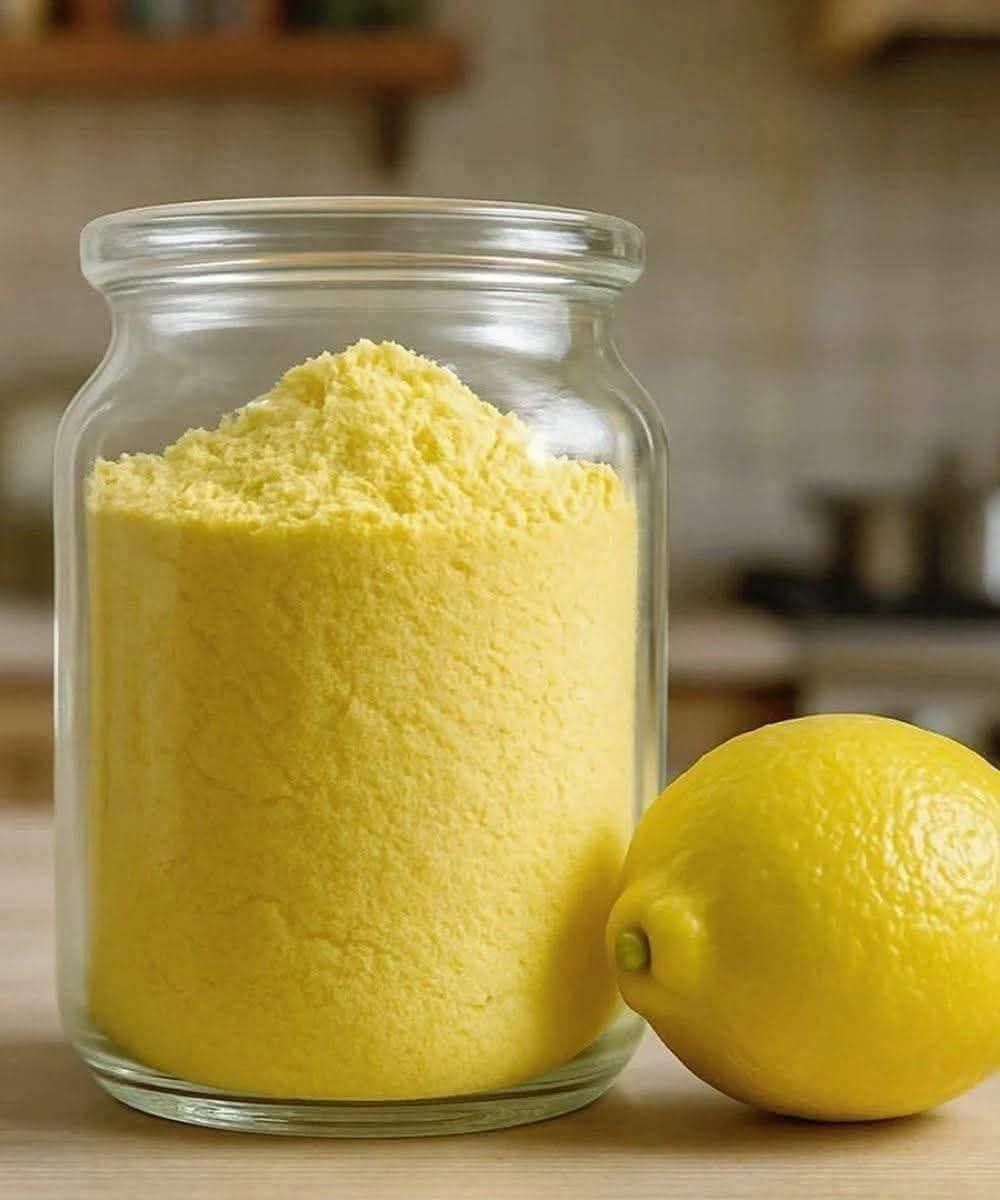Mediterranean Lemon Powder
Mediterranean Lemon Powder is a bright, tangy seasoning that captures the sunny zest of lemons in a shelf-stable form. It’s perfect for sprinkling over grilled fish, roasted vegetables, salads, or even desserts. The combination of dried lemon peel, a touch of citric acid, a bit of sugar for balance, and flaky sea salt creates a unique flavor that’s zesty, tart, and slightly sweet — just like the Mediterranean coastline itself.
Time:
Prep Time: 10 minutes
Drying Time (if needed): 4–6 hours
Total Time: 10 minutes (plus drying if starting from fresh peel)
Ingredients:
Dried lemon peel (from 3–4 lemons, or store-bought dried peel)
1 tsp citric acid
1 tbsp pure icing (confectioners’) sugar
1 tsp flaked sea salt
Instructions:
Prepare the lemon peel:
If using fresh lemons, peel them thinly (avoiding the white pith) and spread the peels on a tray. Let them air dry for 1–2 days, or use a low oven (95°C / 200°F) for about 2–3 hours, until completely dry and brittle.
Grind the ingredients:
Add the dried lemon peel, citric acid, icing sugar, and sea salt to a spice grinder or high-speed blender.
Blend into powder:
Pulse several times until you have a fine, even powder. Taste and adjust — add more sugar for sweetness, or citric acid for extra tang.
Sift and store:
Pass the powder through a fine sieve to remove any coarse pieces. Transfer it to an airtight jar or spice container.
Storage:
Store in a cool, dry place for up to 6 months.
Tips & Variations
Choose the Right Lemons
For the best flavor, use organic lemons since the peel is the star ingredient. Avoid waxed lemons or scrub them well before peeling. Meyer lemons offer a slightly sweeter, floral taste, while regular lemons give a classic tang.
Control the Tartness
Citric acid boosts that sharp lemony kick. If you want a softer flavor, start with ½ teaspoon and adjust to taste after blending.
Sweetness Balance
A touch of icing sugar balances the acidity and salt. If you prefer a more savory version (for meats or seafood), reduce the sugar by half or skip it completely.
Texture Tip
For an ultra-smooth, professional finish, grind the mixture, sift it, then re-grind any leftover coarse bits. This gives the powder a light, silky texture that dissolves easily.
Drying Method Options
Dehydrator: 45–50°C (110–120°F) for about 4–6 hours.
Oven: Lowest setting, with the door slightly open.
Air dry: Takes longer but preserves aroma beautifully.
Make It Custom
Add dried herbs like rosemary, thyme, or basil for a Mediterranean herb twist.
Blend in garlic powder or chili flakes for a savory, spiced seasoning.
For dessert use, mix in a pinch of vanilla sugar or powdered honey for a sweet-tart balance.
How to Use It
Sprinkle over grilled fish, chicken, or roasted vegetables for instant flavor.
Mix into salad dressings, hummus, or yogurt sauces for a bright kick.
Add to baked goods or frosting for a natural lemon flavor.
Stir into cocktails or sparkling water for a refreshing twist.
Storage & Shelf Life
Keep it sealed in a dry, cool cupboard. Moisture dulls the powder and can cause clumping. For best flavor, use within 6 months, though it can last up to a year if stored well.
Presentation Idea
This lemon powder makes a great homemade gift. Package it in small jars with a ribbon and label — perfect for food lovers or as part of a Mediterranean spice set.
Q&A
Q: Can I use store-bought lemon zest instead of drying my own peel?
A: Yes, just make sure it’s unsweetened and fully dried. You may need to adjust the amount slightly, as some commercial zests are more concentrated in flavor.
Q: What’s the purpose of citric acid in this recipe?
A: Citric acid adds brightness and that tart “fresh lemon” taste, especially since the peel alone can be slightly bitter once dried. It’s what keeps the powder tasting vibrant and tangy.
Q: Can I skip the sugar?
A: Absolutely. The icing sugar simply balances acidity. For a purely savory version (great on grilled meats or seafood), you can omit it or replace it with a pinch of garlic powder.
Q: How can I prevent clumping?
A: Make sure the lemon peel is completely dry before grinding. After blending, store the powder in an airtight jar with a small piece of parchment paper or a food-safe silica packet to absorb moisture.
Q: What’s the best way to use lemon powder in cooking?
A: Sprinkle it on fish, salads, roasted vegetables, or pasta; mix it into dressings, marinades, or sauces; or even stir a pinch into desserts or drinks. It adds instant Mediterranean brightness wherever you use it.
Nutrition
(Per ½ teaspoon serving)
(Values may vary slightly depending on lemon size and salt type)
Calories: 2
Carbohydrates: 0.4 g
Sugar: 0.2 g
Fat: 0 g
Protein: 0 g
Sodium: 35–40 mg
Vitamin C: Trace amounts
It’s extremely low in calories and sodium (depending on the amount of salt used), yet packs a big hit of flavor and acidity without added fat.
Conclusion
Mediterranean Lemon Powder is a simple, versatile way to add sunshine to your food year-round. It’s zesty, aromatic, and perfectly balanced — a blend of tangy, salty, and slightly sweet notes that enhances both savory and sweet dishes. With just a few pantry ingredients and a bit of patience, you get a homemade seasoning that instantly transforms everyday meals into something bright and Mediterranean-inspired.

